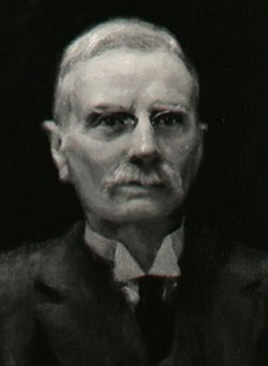| Profile | Major Works | Resources |
Herbert Somerton Foxwell, 1849-1936.

Early English Neoclassical economist, and longtime professor at University College London (UCL).
Herbert S. Foxwell was educated at St. John's College in Cambridge, where he would remain as a fellow for the remainder of his life. Foxwell was one of Alfred Marshall's first pupils. Foxwell positioned himself as an early follower of Jevons and the Neoclassical revolution and helped further the advance of Cambridge Neoclassicism. However, Foxwell was never quite as fond of pure economic theory as either Jevons or Marshall. Foxwell had a more conciliatory attitude towards Classical economics and a penchant for the historical method, to which he grew increasingly attached over time.
In 1875, when W.S. Jevons was appointed to the chair of University College London to replace Courtney, the young Foxwell stepped in to teach in Jevons's place for a semester while Jevons wrapped up his commitments at Owens College, Manchester. After Jevons's retirement in 1881, Foxwell was offered to succeed to his chair at University College London (UCL). Foxwell was reluctant to accept, hoping to obtain the professorship at his beloved Cambridge. But Alfred Marshall was eager to secure the UCL chair for the Neoclassicals and persuaded Foxwell to accept it, on the promise that it would be only temporary, and that Foxwell would eventually succeed to the Cambridge chair on Marshall's own retirement.
While a professor at UCL, Foxwell remained his residence in Cambridge, lecturing at St. John's throughout and participating in Cambridge-related activities. Foxwell was a vigorous proponent Cambridge extension lectures and participated in lecture tours to working class audiences. He was a founder and leading member of the Cambridge Junior Liberal Club (f. 1882), the Cambridge branch of the Imperial Federation League (1885) and the first president of the Cambridge Economic Club (1887). During this time, Foxwell grew particularly entranced by the bimetallism question.
However, by the mid-1900s, it became obvious that the younger and more theoretically-minded Arthur C. Pigou had become Marshall's heir-apparent. The strained relationship between Marshall and Foxwell finally broke when Pigou was appointed to the Cambridge chair upon Marshall's retirement in 1908. That same year, Foxwell's student, Henry Higgs, proposed to raise money for a second chair at Cambridge specifically for Foxwell, but the retired Marshall leaped in to sink the proposal, openly declaring Foxwell unfit. To this injury was added insult in 1916, when Pigou petitioned for exemption from military service in World War I, on account that there was "no one" at Cambridge able to replace him (Foxwell mischievously wrote to the draft council reminding them he was available and ready.)
Although still resident at Cambridge and lecturing there throughout, the repeated entanglements with Marshall and Pigou drove Foxwell to gradually withdraw his loyalties and commitments from that university, and focusing more on UCL.
Herbert S. Foxwell was an avid book collector. Having married in 1898 and in urgent need of money, Foxwell sold his massive economics library, consisting of some 40,000 books and pamphlets on economic topics, to the Goldsmiths' Company of London in 1901 for £10,000, which promptly donated it to the UCL. The company granted Foxwell a further £4,000 to complete collections and bind the volumes. Foxwell's collection is currently held as the Goldsmiths' Library in the Senate House Library at UCL. But this was not the end of Foxwell's bibliomania. Foxwell amassed a new collection after 1901. In financial straits after the 1929 crash, Foxwell's sold his second collection of 20,000 volumes to Harvard University for £4,000, becoming the Kress Library at Harvard.
|
Major Works of Herbert S. Foxwell
|
|
HET
|
|
Resources on Herbert S. Foxwell
|
All rights reserved, Gonçalo L. Fonseca
